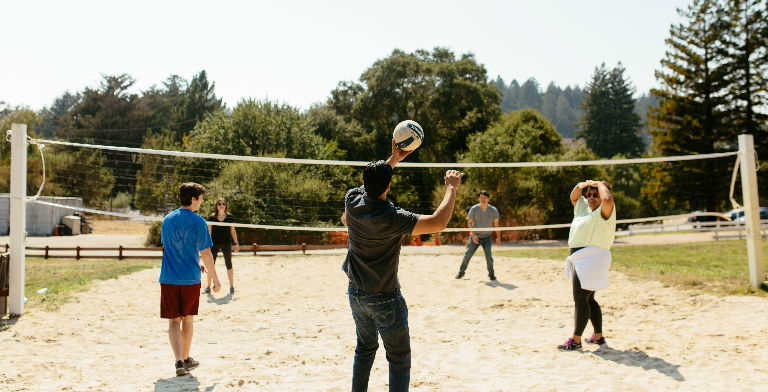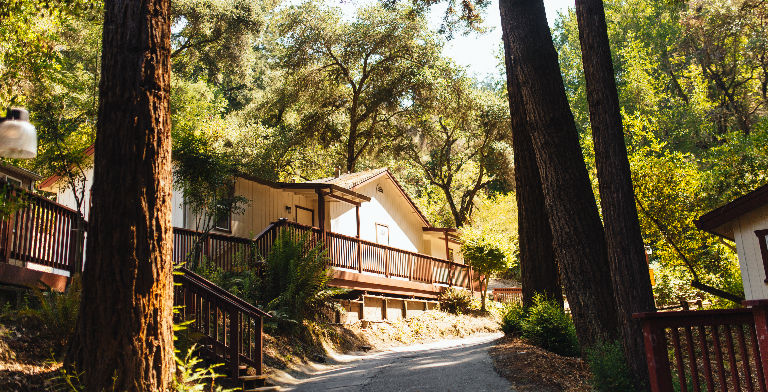The Camp Recovery Center helps adults struggling with stimulant addiction find long-term recovery. Located near Scotts Valley & San Jose, CA, The Camp provides premier substance abuse rehabilitation.
Stimulant Addiction Rehab
Stimulant Addiction Rehab Near Santa Cruz & San Jose
Stimulants are a group of psychoactive substances, some of which are legal and some of which are not, that can impact a user’s physical and cognitive functioning through effects such as increased energy, improved focus, and heightened sense of motivation and self-confidence. Caffeine and nicotine are both stimulants, as are cocaine, ephedrine, and methamphetamine. Additionally, prescription medications that contain stimulants are often used to treat symptoms associated with attention-deficit/hyperactivity disorder (ADHD).
Stimulants are commonly abused substances, many of which have a high potential for addiction. Whether a person has been abusing a prescription stimulant for purposes of self-medication or an illegal stimulant for a recreational high, chronic abuse and dependence upon these substances can be a devastating experience that can be difficult to escape without professional intervention, such as receiving stimulant addiction treatment at a rehab center.
At The Camp Recovery Center, we have been helping individuals overcome stimulant addictions for more than 30 years. Through the decades, we have developed a number of specialized rehab techniques that have proved to be particularly effective with adolescents and adults who have become dependent upon stimulants.
Helping a Loved One
Helping a Loved One or Family Member Enter Stimulant Addiction Rehab
Stimulant addiction is a serious condition that requires professional treatment. However, this does not mean that loved ones have no role to play in helping a friend or family member who has been abusing these dangerous substances. If someone you care about has become addicted to stimulants, please consider the following:
- Learn everything you can about the disease of addiction in general, as well as the specific ways that stimulant addiction impacts a person’s body and mind.
- Research the types of rehab centers and treatment options that are available to people who have become dependent upon stimulants.
- Look into specific rehab centers that may be ideally suited to meeting your loved one’s unique needs.
- Learn how to talk to someone about their stimulant addiction. What you say, how you say it, and even when or where you have this conversation can be extremely important.
- Keep an open mind and a loving heart. Never lose sight of the fact that your loved one’s behaviors are not evidence of poor self-control or a lack of character. He or she is struggling with a disease. Resist the temptation to judge; instead, focus on getting your loved one the help that he or she so desperately needs.
- Offer to drive your loved one to appointments, make contact with potential rehab centers, arrange for childcare, or provide any other support that will help him or her get into treatment.
Ultimately, the best way to support a loved one before, during, and after stimulant addiction rehab is to remember that recovery is a long and winding path. Be an active positive presence in your loved one’s life. Commit to being there for the good times and the bad, and continue to learn how best to be a valuable member of his or her recovery support network.
Why Consider Us?
Why Those Near Santa Cruz & San Jose Should Consider Stimulant Addiction Treatment at The Camp Recovery Center
Untreated stimulant addiction puts people at ever-increasing risk for experiencing grievous physical, mental, and emotional harm. Physically, the long-term abuse of stimulants has been associated with heart, lung, liver, and kidney damage, some of which may be irreversible. The impact of stimulant abuse on a person’s cognitive abilities can include difficulties with problem-solving, diminished capacity for abstract thinking, and impaired ability to make and/or access memories.
People whose bodies and minds have been ravaged by stimulant abuse will have problems meeting their responsibilities at work or in school, and are unlikely to be able to productively participate in healthy interpersonal relationships. As a person continues to struggle with these ramifications of their stimulant addiction, negative outcomes such as family dissolution, academic failure, job loss, financial ruin, legal problems, and homelessness become increasingly likely.
Types of Treatment
Types of Stimulant Addiction Treatment Offered at The Camp Recovery Center
Nestled in the foothills of the majestic Santa Cruz Mountains, The Camp Recovery Center is a center for hope and healing where clinically sophisticated rehab is provided in a serene and secure environment.
For more than 30 years, The Camp has remained dedicated to providing the highest quality of life-changing rehab to adults who are struggling with stimulant addiction and other forms of drug dependency. Individuals who choose to receive treatment with us have the opportunity to work with talented and experienced nurses, addiction counselors, family therapists, and other professionals whose clinical expertise is surpassed only by their commitment and compassion for helping others.
Rehab at The Camp is a highly personalized experience, with each resident following a plan that has been customized to ensure that we are providing the type and level of care that best meets his or her unique needs. The following are among the many elements that may be included in a resident’s rehabilitation plan at The Camp:
Detoxification: For individuals who have been unable to rid their bodies of stimulants or other drugs prior to arriving at The Camp, detoxification can be an essential precursor to full participation in treatment. When a resident is determined to be in need of detox services, we will coordinate with an offsite doctor, typically located near the Santa Cruz/San Jose, CA area, who will develop and approve an appropriate detox protocol. As is the case with all aspects of treatment at The Camp, detox protocols are developed and implemented in the manner that best meets the specific needs of each resident.
Medication management: Residents whose stimulant addiction is accompanied by a co-occurring mental health condition may receive a referral to meet with a psychiatrist to determine if prescribed medication should be incorporated into their rehab plans. Residents who receive medications will meet with the psychiatrist on a weekly basis to monitor their progress and adjust their prescriptions if necessary. Members of our nursing staff also assist in monitoring residents’ medications.
Individual therapy: Residents receiving treatment for stimulant addiction meet with their case managers two times each week for individual therapy sessions. These sessions allow residents to process their experiences, discuss their rehab progress, and address any concerns that have arisen since the previous session.
Group therapy: Group therapy is an essential part of treatment for stimulant addiction at The Camp. A variety of groups are scheduled every day, including weekends. Process groups are conducted five days a week. The following are examples of specific groups that may be conducted during a resident’s time at The Camp:
- Activity Group
- CBT Groups
- Detox Groups
- Experiential Group
- Focus Groups
- Music / Poetry Groups
- Men’s Group
- Women’s Group
The following are a few examples of the many topics that may be addressed in group therapy sessions at The Camp:
- Self-helping thinking
- 12-Step Recovery
- SMART Recovery
- Relapse prevention
Family therapy: Residents engaging in rehab for stimulant addiction have the opportunity to participate in family therapy sessions twice each month. These sessions, which are led by marriage and family therapists, are designed to facilitate healthy communication among family members, address negative feelings and emotions, and promote the healing and strengthening of the family unit.
Experiential therapy: A variety of experiential therapies are scheduled every week at The Camp. Residents also have the opportunity to spend time in our gym six days a week. Additional experiential therapies at our rehab center include the following:
- Acupuncture
- Meditation
- Yoga
Community meetings: Resident-run community meetings are held every morning, including both weekdays and on the weekends. These meetings, which are a major component of the rehab process at The Camp, provide an opportunity for residents to review the agenda for the day, do readings, and address any issues that are relevant to the group. In addition to being sources of important information, community groups promote healthy independence and interdependence while also facilitating the formation of productive sober relationships that can be essential to supporting long-term recovery from stimulant addiction.
At The Camp Recovery Center, we know that residential rehab is just one step on the path of lifelong recovery from a stimulant addiction. To ensure that every adult who completes rehab with us is best prepared for the next phase of his or her recovery, our case managers work closely with all residents to ensure that sources of continuing care and support have been identified, and all necessary arrangements for accessing this care have been made prior to discharge.
For adult residents who need a more structured level of care during their transition from residential treatment, we also offer intensive outpatient programming (IOP). Intensive outpatient programming is located convenient to the Santa Cruz and San Jose, CA areas.
In the same manner that we provide a highly personalized rehab experience during a resident’s time at The Camp, we are similarly dedicated to ensuring that, as they prepare to leave our campus, all residents have a continuing care plan that addresses the specific issues that are essential to their long-term recovery from stimulant addiction.
















